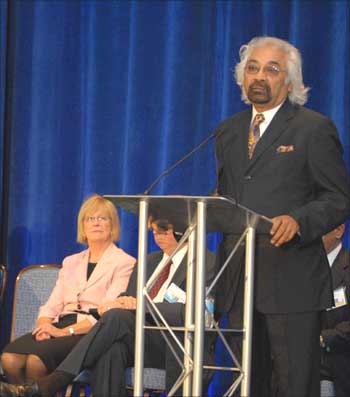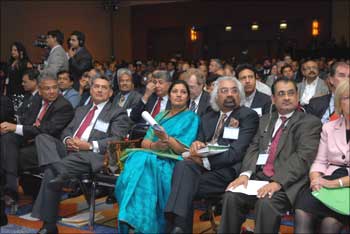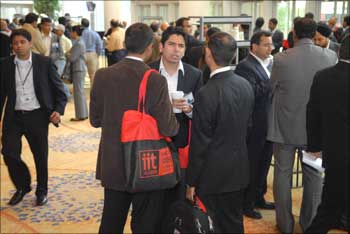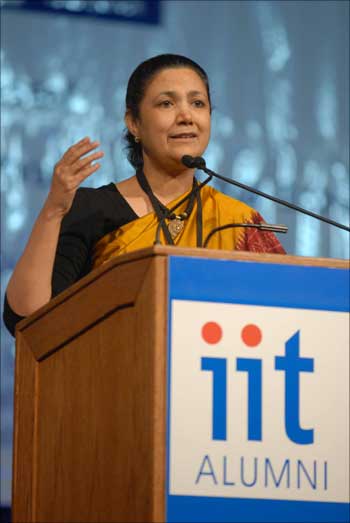 | « Back to article | Print this article |
'IT industry has to fight against economic disparities'
Sam Pitroda, the architect of India's telecom revolution is the centre of attraction at the PanIIT conference held at the Convention Centre in Schaumburg, near Chicago.
People who have heard about how he straddles India and America, while serving as an IT advisor to the Prime Minister Manmohan Singh, and connecting with the entrepreneurs across America, even think of him as a prophet.
At the conference, Pitroda shared his thoughts with IIT-ians on various issues from human resources management to educational challenges in India.
The IT industry has to fight vigorously against economic disparities in India, says Pitroda, asserting on reducing disparity of income, galvanizing the younger Indians (555 million under the age of 25) and creating an overall development.
"While $40,000 per year for a US degree, means a teacher/student ratio of 1 is to 20 or 30. I think using IT, we can do it cheaper, with a 1 is to 1,000 teacher/student ratio," he said.
'IT industry has to fight against economic disparities'
As an entrepreneur, Pitroda has established several companies in the US and Europe. He has to his credit more than 75 worldwide patents.
One of the first entrepreneurs of Indian origin in America, he has been working with the Indian government from the early 1980s.
Referring to opposition in some parts of India on the use of technology at work, he said there is a creative way of approaching such problems.
More than two decades ago when computerisation of train ticket bookings was proposed, critics said railway clerks would oppose it. But when some of the opponents were briefed about the tangible benefits such as air-conditioned offices, the mindset changed, he recalls.
'IT industry has to fight against economic disparities'
The conference began with an inspiring speech by Daggubati Purandeswari, the Minister of State for Human Resource Development. Meera Shankar, India's ambassador to America delivered one of the best received speeches at the three-day Pan IIT event attended by over 2,000 delegates.
Talking at length on 'creative destruction' of the economy, which is being transformed by IT, Purandeswari suggested that there is no use going back to the old system, which had governed India for several decades after the Independence. She stressed on the need of "open markets for (creating) innovation."
There are islands of development across India, which are admired by many and benefiting thousands, she said, but they are "in the sea of underdevelopment."
The government is aware, she continued, that while 'harnessing the galloping technology,' it should do so with a human face.
'IT industry has to fight against economic disparities'
Purandeswari recalled how a young entrepreneur was challenged in an interview to define India. If the US is a land of opportunities what is India? he was asked. 'It is the land of ideas,' he said.
The present generation in India is not thinking of a better future for their children and grandchildren, she said.
They want it first for themselves. The expansion of institutions like the Indian Institutes of Technology across India, help from IIT-ians and the alumni of like minded institutions will have to play an important role in the knowledge and technology driven economy, she added.
"Our dreams have to be audacious," she argued but they should also be accompanied by kinder instincts.
'IT industry has to fight against economic disparities'
Meera Shankar in her address said entrepreneurs across India are learning fast to offer affordable and good quality products not only for Indians but also for world buyers, thanks to the low cost of manufacturing cars and other products in India. Renault is making small cars not only for the Indian market but also exporting it to Europe.
The real estate market in India used to cater to overseas Indians for a long time, she said. But now companies like the Tatas have taken a lead in constructing affordable houses, near Mumbai.
Innovations occur and flourish in societies that are "democratic and pluralistic," she asserted. When people voice their opinions, question and criticise and engage in discussions, the process "provides the muscle for innovation."
The "boisterous" process can be a "huge strength for the society," she added.
The private-public partnership can fuel the rapid changes in improving the vocational skills and upgrade the vocational training system, she explained.
The age of technologically trained entrepreneurs looking down on those who had little technology skills is fast disappearing, she said.




